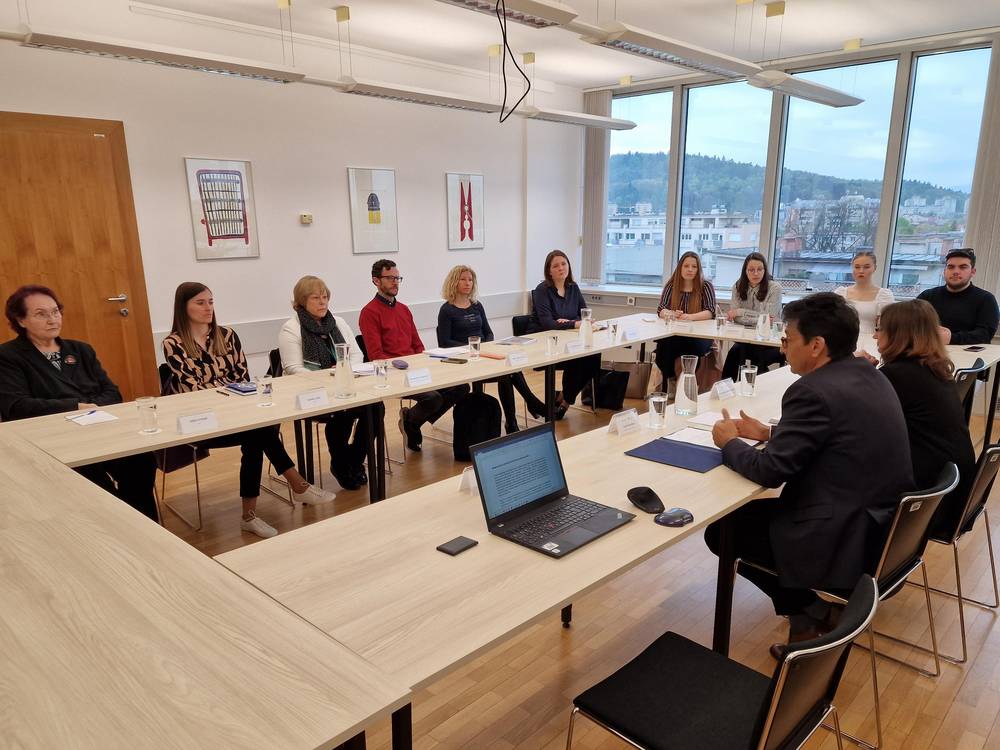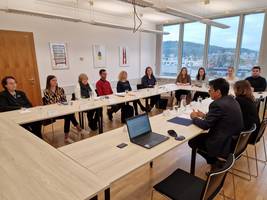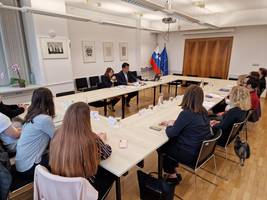In light of the upcoming European Day of Solidarity between Generations which is commemorated on 29 April, the Human Rights Ombudsman, Peter Svetina, has invited the representatives of civil society that work in this area for a discussion on 24 April 2023. He highlighted that the principle of solidarity is one of the fundamental principles for the functioning of the welfare state system. “Solidarity is also connected to the boundary between social and private risks when certain burdensome events occur in the life of an individual, such as old age, illness, disability, or death and similar events. Who is responsible for income security in case of a loss or reduction in income due to, e.g., old age, disability, or death is the crucial social security issue,” the Ombudsman stated.
He also observed that the issue of the youth and the elderly is too often in society discussed separately. Discussing more about understanding and cooperation between the generations is something that is missing because, in terms of the future of society, intergenerational cooperation and sustainable development are crucial. The Ombudsman wishes for us, as a society, to precisely define the primary challenges where we could bring about changes for the better and greater awareness regarding the advantages and significance of intergenerational cooperation and coexistence through joint efforts.
Among other things, the meeting participants discussed the issue of financing the solidarity between generations programmes, the access to adequate health care for all generations, deinstitutionalisation, the entry of young people into the labour market, and fair remuneration for performed work, the concept of mentorship that is not yet well-established, as well as the housing shortage and policy. They also devoted attention to the problems with mental health and stigma, loneliness, and social exclusion that follows it.
The Ombudsman emphasised that the economic position of older generations and growing poverty are two problems that need to be addressed urgently because there are too many pensions that do not enable a decent living. “Therefore, we at the Ombudsman support all measures improving the position of pensioners,” the Ombudsman clarifies, while with regards to the employment of the elderly, he advocates that the work environment should be adequately adapted to older workers and that they should be allowed to work if they so desire and are able to.
The Ombudsman supports the efforts of the United Nations in preparing the Convention on the Rights of Older Persons, unfortunately, the talks are being held at too slow of a pace. He also realises that greater awareness of the elderly is necessary, both related to their rights and the prevention of violence, discrimination, the significance of financial autonomy, and related topics. Often the elderly do not realise that they are the targets of ageism and discrimination. That is why it is necessary to raise awareness to recognise stereotypes among them as well. “We have noticed an increase both in intersectional discrimination or exclusion when it comes to deprivation based on multiple personal circumstances of the individual, while discrimination and exclusion take on an even worse form when paired with it. Undoubtedly, this group includes female pensioners,” the Ombudsman emphasises.
“Too often we hear the modern phrase that digitalisation of society is an area where the synergy between the old and the young is particularly possible. It seems that digitalisation would solve all problems of an individual subsystem, of course, that is just not the case. For some, digitalisation brings additional worries because not everyone is proficient in adapting to new technologies and applications,” the Ombudsman reckons. On that occasion, he pointed out the project of Ombudsman’s Corners, where the information about the Ombudsman’s work is available in printed form and, also, in digital form for the more proficient.
The Ombudsman especially thanks all those who nurture the values of volunteering, which has a special place in the framework of solidarity between generations.
The representatives of the Slovenian Association of Pensioners, Slovene Philanthropy, The Slovenian Third Age University, the National Youth Council of Slovenia, and the Slovenian Students’ Union, and the Ombudsman for Students’ Rights, Živa Dokl, all participated at the meeting. They concurred that these kinds of meetings are extremely useful in terms of the participation of the non-governmental sector and better target path to solutions.



